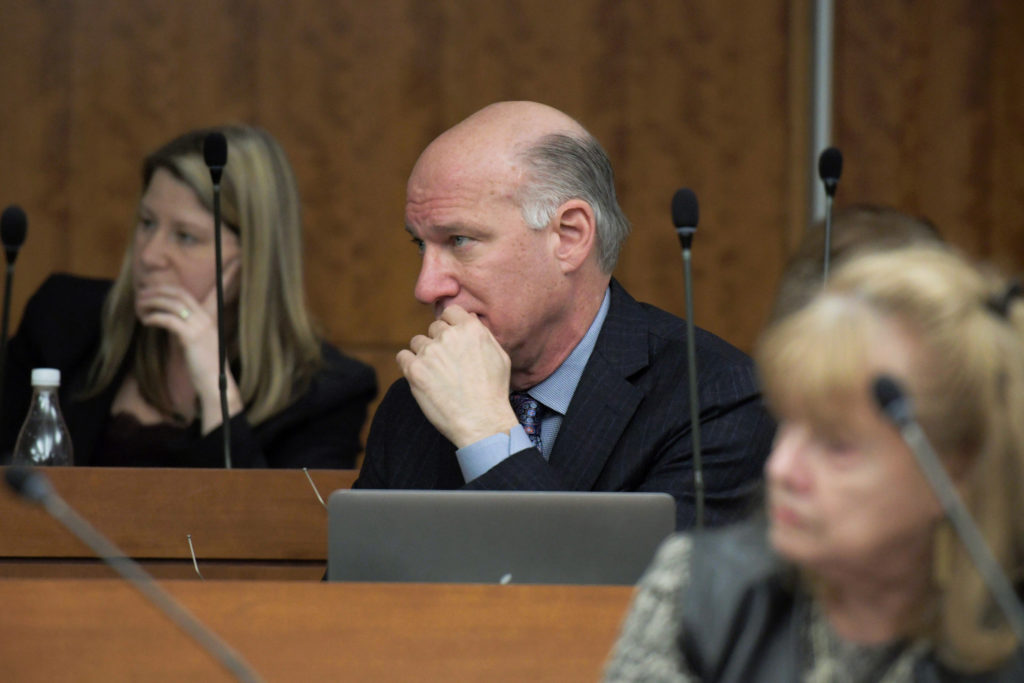The School of Medicine and Health Sciences launched a search committee last month to find a new dean and vice president for health affairs.
Officials announced at a Faculty Senate meeting in March that a committee is looking for someone to replace outgoing medical school Dean Jeffrey Akman, who announced his plan to resign in January. Faculty and medical school experts said the incoming dean should understand the school’s culture and the goals of faculty and staff.
University spokeswoman Maralee Csellar said Anton Sidaway, the chair of the surgery department and a professor of surgery, and the employment search firm Isaacson, Miller will lead the search. Phillip Jaeger, Katie Stellato and Ashton Lange – consultants at the recruitment firm – will help lead the search, according to a release from Isaacson, Miller earlier this month.
“We will continue the search until we find the most qualified candidate,” Csellar said in an email.
She said the search committee was formed according to medical school bylaws governing how to conduct dean searches. Eight faculty and at least one student appointed by the SMHS Executive Committee will serve on the committee, according to the bylaws.
Csellar declined to say when a new dean will be appointed.
Akman, the current medical school dean and the vice president for health affairs, will return as a faculty member at GW once a successor is appointed. He focused on expanding research initiatives and increasing diversity of medical school students during his tenure as dean, and he oversaw administrative processes in the medical school as vice president for health affairs.
In the past year, the deans of the College of Professional Studies, the Columbian College of Arts and Sciences and the School of Engineering and Applied Science have left the University and have not yet been replaced. Isaacson, Miller will also assist searches for these deans.
Medical school faculty members said the new dean should continue Akman’s efforts to expand research in the medical school and provide equal opportunities for research funding and promotions to members of all departments.
Julia Cruz, a clinical instructor of medicine, said the search committee should consist of an equal number of members from a variety of departments, like oncology and microbiology, within the medical school. Cruz said asking for feedback about the medical school from faculty in a range of departments prevents the incoming dean from favoring one department over another when allocating funding for research or promoting faculty members.
“I think that’s kind of the best example I can think of – somebody who is willing to ask hard questions and be supportive, but do that in a consistent way across the board, without having prejudice for or against any specific sub-specialty or area of expertise,” she said.
Andrew Garrett, an associate professor of clinical research and leadership, said the new dean of the medical school should continue to prioritize medical research to raise the University’s research profile.
In the past three years, the University has increased spending on research efforts to bolster research conducted at GW.
“Taking a purposeful look at making sure that the research environment is embraced and that it is adequately resourced for faculty which are involved, can be a challenge for someone who’s overseeing all aspects of a medical school, remains an important priority,” Garrett said.
He said the new hire, whether they are internally or externally hired, should take time to understand the school’s working environment and the needs of faculty and staff, like research funding and advancement opportunities, to better serve the school.
“You need to have the ability to win hearts and minds and influence people to move in the direction that’s laid out by the school,” Garrett said. “The leadership of the dean has to be critically important to bring all of the different moving parts together.”
Medical school experts said the new dean must effectively communicate with administrators and emphasize the school’s current strengths in teaching and research within their first few years as dean.
Charles Falcone, a consultant at the search firm Russell Reynolds Associates, which specializes in medical school administrative searches, said prospective medical school deans should set agendas to fulfill what he said is the “tri-part mission” of medical schools: teaching, research and clinical work.
“They’ve got to be able to balance those missions, they’ve got to be able to have a thorough understanding of those missions, and it’s best that they’ve got deep experience in at least one or two of those missions, oftentimes all three as well,” Falcone said.
John Mahoney, the associate dean for medical education at the University of Pittsburgh, said the new dean must frequently and actively engage with other medical school administrators because they facilitate communication between administrators and faculty.
“This isn’t a sit back and watch the machine run kind of role – this is something you really have to have passion about for the goals of the school,” Mahoney said.





